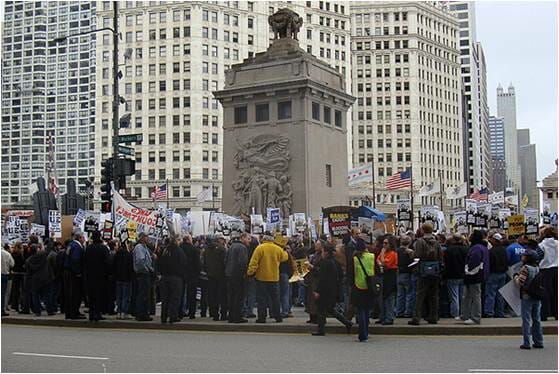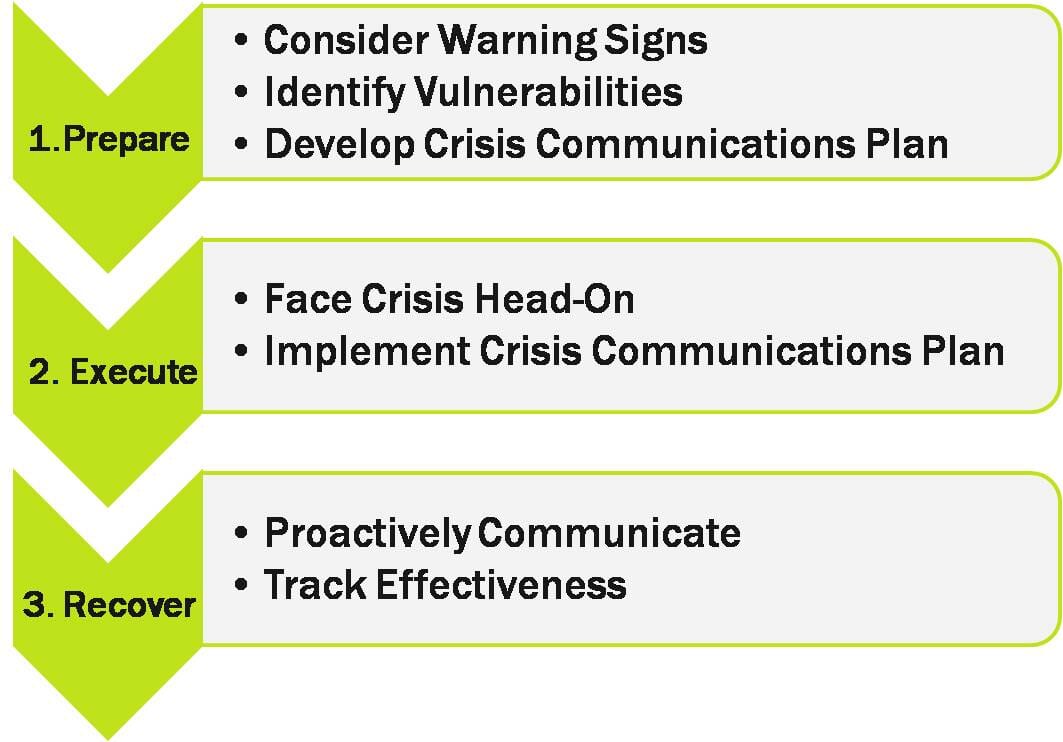Crisis Communications for Building Owners and Managers During the NATO Summit

In my nearly 30 years of crisis communications, I’ve helped address many issues and crisis situations affecting the commercial real estate industry. Although the communications strategies differ for each crisis, it’s clear the organizations that actively communicate and have the most robust crisis communication plans maintain the best reputations. And as Warren Buffett famously said, “It takes a lifetime to build a reputation and only a few seconds to destroy one.”

A demonstration in downtown Chicago
For building owners and managers specifically, reputations are sacred. Ineffective communications during an incident can lead to a loss of current and prospective tenants and employees, financing, pending deals and credibility. Owners and managers of Chicago’s downtown commercial buildings are likely going to be put to the test next month during the NATO Summit in how they communicate to key stakeholders.
There are many crisis scenarios that may involve your building during the NATO Summit, such as:
- A peaceful demonstration could escalate into a volatile, potentially violent protest outside of your building, prompting local news crews to arrive seeking comments;
- The City of Chicago could issue an extreme security threat alert and shut down all public transportation (including Amtrak, CTA, Pace and Metra), stranding tenants and employees in the Loop;
- A man with a crude bomb in his backpack could enter your lobby and demand access to a tenant company.

The steps you take now will determine how and how well you communicate during a potential crisis situation next month, next year or 10 years from now. Best practice crisis communications for building owners and managers is a three-part process: Prepare, Execute and Recover.
Prepare: Preparation is the single best way to ensure your reputation stays intact during and after a crisis. With less than one month before the NATO Summit, building owners and managers should have a crisis communications plan in place for various issues that may arise. A strong plan contains a vulnerabilities assessment such as potential communications and operational breakdowns.
Preparing materials in advance of the NATO Summit ensures you won’t have to scramble for data and resources during a crisis. Some materials for Chicago building owners and managers to consider developing include:
- Building fact sheet, including the year built, construction materials, number of floors, life safety attributes, number of building staff, etc.;
- Full contact lists of Chicago Police Department, employees, tenants, building staff, local media, partners, legal counsel and insurance brokers;
- Streamlined response/communications protocol, including who will be appointed spokesperson to address various stakeholders should an incident occur;
- Template press releases and tenant notifications; and
- Rules of engagement with the media.
Stay informed of developments and news related to the NATO Summit by monitoring local media, BOMA/Chicago’s dedicated web page, protestors’ blogs, NotifyChicago alerts and Chicago’s Public and Private Partnership (CP3). Consistent monitoring will help identify warning signs such as unusual activity or a heightened interest in your building by the media and/or protesters.
Execute: In the event that a protest or threat escalates into a crisis situation, building owners and managers must effectively communicate to key stakeholders. This includes updating your building’s website, issuing statements and sending notifications to tenants, employees and staff. If possible, all communications during a crisis should contain updated information incorporating new developments and corrections to any false statements or rumors. Building owners and managers can work with the Chicago Police Department to gather accurate information needed to provide timely updates whenever possible.

If an incident occurs during the NATO Summit that involves a commercial building, it’s possible that the building owner and/or manager will be contacted by the media for comments. In this scenario, spokespeople must effectively communicate as much relevant information as possible, but should not speculate or unnecessarily heighten the situation. When working with media, it’s best to keep answers brief: Speak in headlines and speak slowly and clearly. This avoids message misinterpretation.
Recover: Crisis communications is ongoing. After an incident, building owners and managers should update their crisis communications plans as soon as possible to reflect what was successful and what needs reevaluating. In addition, proactive communications with key stakeholders like tenants, employees and media will ensure the building’s reputation is solidified for years to come.
A crisis situation during the upcoming NATO Summit in Chicago may or may not occur, but the event merits that all local building owners and managers are prepared. Effective crisis communications will not only ensure the safety of your tenants, employees and staff, it can also build and protect your reputation as an effective leader in Chicago’s commercial real estate industry.
What steps have you taken to prepare for the upcoming NATO Summit?

